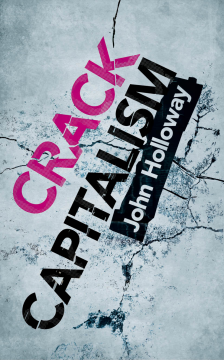
Additional Information
Book Details
Abstract
How can we rebel against the capitalist system? John Holloway argues that by creating, cracks, fractures and fissures that forge spaces of rebellion and disrupt the current economic order.
John Holloway, author of the groundbreaking Change the World Without Taking Power, sparked a world-wide debate among activists and scholars about the most effective methods of fighting capitalism from within. From campaigns against water privatisation, to simply not going to work and reading a book instead, Holloway demands we must resist the logic of capitalism in our everyday lives. Drawing on Marx's idea of 'abstract labour', Holloway develops 33 theses that will help you create, expand and multiply 'cracks' in the capitalist system.
'Infectiously optimistic'
Steven Poole, the Guardian
Table of Contents
| Section Title | Page | Action | Price |
|---|---|---|---|
| Cover | Cover | ||
| Contents | v | ||
| Part I - Break | 1 | ||
| 1. Break. We want to break. We want to create a different world. Now. Nothing more common, nothing more obvious. Nothing more simple. Nothing more difficult. | 3 | ||
| 2. Our method is the method of the crack. | 8 | ||
| 3. It is time to learn the new language of a new struggle. | 10 | ||
| Part II - Cracks: The Anti-Politics of Dignity | 15 | ||
| 4. The cracks begin with a No, from which there grows a dignity, a negation-and-creation. | 17 | ||
| 5. A crack is the perfectly ordinary creation of a space or moment in which we assert a different type of doing. | 21 | ||
| 6. Cracks break dimensions, break dimensionality. | 27 | ||
| 7. Cracks are explorations in an anti-politics of dignity. | 38 | ||
| Part III - Cracks on the Edge of Impossibility | 47 | ||
| 8. Dignity is our weapon against a world of destruction. | 49 | ||
| 9. Cracks clash with the social synthesis of capitalism. | 51 | ||
| 10. Cracks exist on the edge of impossibility, but they do exist. Moving they exist: dignity is a fleet-footed dance. | 71 | ||
| Part IV - The Dual Character of Labour | 81 | ||
| 11. The cracks are the revolt of one form of doing against another: the revolt of doing against labour. | 83 | ||
| 12. The abstraction of doing into labour is the weaving of capitalism. | 87 | ||
| 13. The abstraction of doing into labour is a historical process of transformation that created the social synthesis of capitalism: primitive accumulation. | 100 | ||
| Part V - Abstract Labour: The Great Enclosure | 107 | ||
| 14. Abstract labour encloses both our bodies and our minds. | 109 | ||
| 15. The abstraction of doing into labour is a process of personification, the creation of character masks, the formation of the working class. | 114 | ||
| 16. The abstraction of doing into labour is the creation of the male labourer and the dimorphisation of sexuality. | 119 | ||
| 17. The abstraction of doing into labour is the constitution of nature as object. | 125 | ||
| 18. The abstraction of doing into labour is the externalisation of our power-to-do and the creation of the citizen, politics and the state. | 130 | ||
| 19. The abstraction of doing into labour is the homogenisation of time. | 135 | ||
| 20. The abstraction of doing into labour is the creation of totality. | 141 | ||
| 21. Abstract labour rules: the abstraction of doing into labour is the creation of a cohesive law-bound totality sustained by the exploitation of labour. | 145 | ||
| 22. The labour movement is the movement of abstract labour. | 151 | ||
| Part VI - The Crisis of Abstract Labour | 163 | ||
| 23. Abstraction is not just a past but also a present process. | 165 | ||
| 24. Concrete doing overflows from abstract labour: it exists in-against-and-beyond abstract labour. | 172 | ||
| 25. Doing is the crisis of abstract labour. | 178 | ||
| 26. The breakthrough of doing against labour throws us into a new world of struggle. | 197 | ||
| Part VII - Doing Against Labour: The Melodies of Interstitial Revolution | 201 | ||
| 27. Doing dissolves totality, synthesis, value. | 203 | ||
| 28. Doing is the moving of the mulier abscondita against character masks. We are the mulier abscondita. | 212 | ||
| 29. Doing dissolves the homogenisation of time. | 227 | ||
| Part VIII - A Time of Birth? | 243 | ||
| 30. We are the forces of production: our power is the power of doing. | 245 | ||
| 31. We are the crisis of capitalism, the misfitting-overflowing of our power-to-do, the breakthrough of another world, perhaps. | 250 | ||
| 32. Stop making capitalism. | 253 | ||
| 33. | 262 | ||
| thanks | 263 | ||
| Notes | 265 | ||
| Bibliography | 287 | ||
| Author Index | 299 | ||
| Subject Index | 302 |
